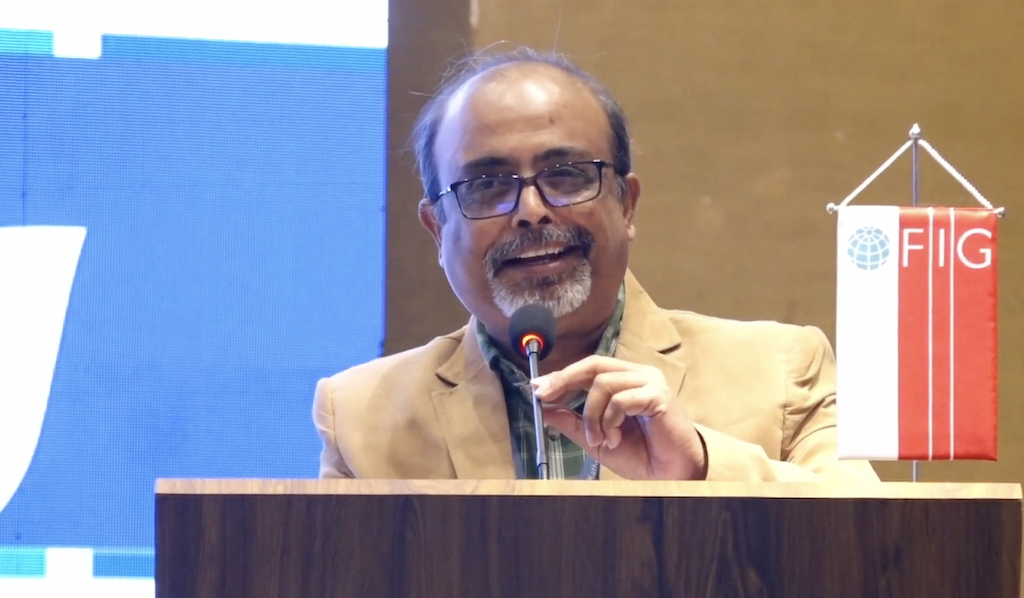Land administration has historically focused on economic growth and formalization – now it must evolve to address climate imperatives.
Pranab Choudhury, Director, Landstack, tried to set the momentum for this inevitable shift in his plenary address at the FIG Regional Conference ‘Climate Responsive Land Governance and Disaster Resilience: Safeguarding Land Rights’ organised at Kathmandu, Nepal on 14-16 November, 2024. His speech explored the intersections of land governance, digitization, and climate resilience, highlighting the challenges and opportunities in the global South. He underscored the importance of balancing technological advancements with social and ecological priorities.
He highlighted how land administration in regions like South Asia has shifted from redistribution and social justice during the mid-20th century to titling and digitization in the post-liberalization era. While this shift has improved efficiency and scale of land records digitisation and transactions, it has also sidelined social reform and equity in the process. Pranab argued that the current focus on individual land titling and digitization, while beneficial for land market and economic growth, falls short of addressing the socio-ecological dynamics critical for climate resilience. In many cases, these systems exclude marginalized populations, perpetuating inequality.
To make his case, Pranab provided data from India to illustrate this disparity. Despite significant investments in digitizing land records, only a small fraction of these records are accurate and legally valid. Issues such as outdated maps, lack of synchronization, and incomplete records, also undermine the effectiveness of these systems. Furthermore, critical aspects like women’s land rights remain unaccounted for, as digitized records often fail to include gender-specific data, thereby hindering progress toward global sustainability goals.
The push for digitization brings its own risks. Rapid advancements, driven by the need for speed and cost-efficiency, often compromise essential processes like rights settlement and community consultation. For instance, in India, drones are used to map lands at minimal costs, but this often excludes community participation, leading to disputes and inaccuracies. He highlighted the unintended consequences of these innovations, including increased visibility risks that allow powerful intermediaries to exploit centralized land data for personal gain.
Addressing the broader context, the speech delved into the role of land in climate action. With global initiatives requiring vast tracts of land for renewable energy and afforestation, the pressure on common lands—often the lifeline of rural and indigenous communities—has intensified. In India, projections indicate that up to 10% of the country’s geographical area might be needed to meet renewable energy goals. Much of this demand falls on public and common lands, which, historically, have been poorly surveyed and inadequately managed. The resulting land conflicts, frequently centered around these common lands, underline the urgent need for inclusive and sustainable governance frameworks.
Pranab emphasized the positive role of indigenous and community-led tenure systems in promoting climate resilience. Drawing examples from across the globe, he noted that lands managed under community tenure often exhibit better biodiversity, carbon sequestration, and ecological outcomes, even without formal titles. In Nepal, for instance, community forest user groups have successfully increased forest cover, demonstrating the potential of decentralized governance.
Challenging the mainstream narrative that formalization and digitization are the only pathways to tenure security, he argued for a more nuanced approach. He highlighted the theories of legal geography and psychological ownership, which show that people often feel secure in their land rights without formal titles. This sense of stewardship drives conservation efforts and fosters sustainable land use practices.
The speech concluded with a call to rethink land administration through a climate lens. It urged policymakers to explore alternative tenure models, such as community titling and legal pluralism, and to prioritize decentralized governance systems over centralized, technology-driven frameworks. By aligning land governance with socio-ecological systems, Pranab argued, we can create solutions that not only meet climate goals but also empower marginalized communities and ensure equitable outcomes.
This blog is made out of a presentation made by Pranab in the ‘Plenary Session I: Climate Responsible Land Governance on 14 Nov at the 9th FIG Regional Conference 2024. The title of the presentation was Making a Case for Climate Responsive Land Administration and it was jointly developed by Mr Pranab R Choudhury and Dr Richa Joshi. The abstract and presentation are available here.


